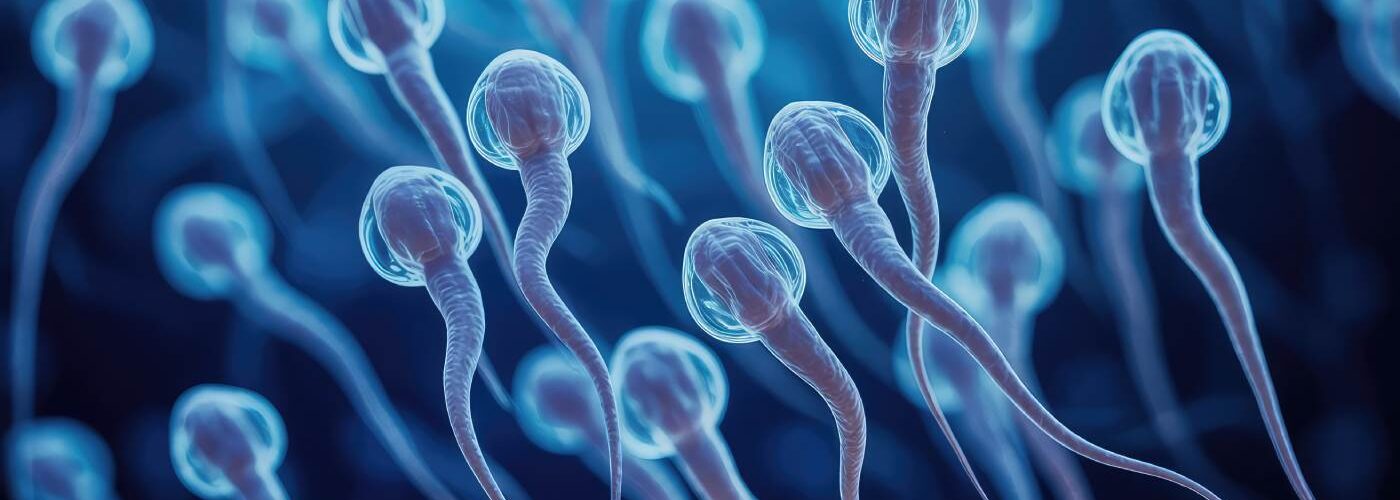
Sperm DNA refers to the genetic material contained within sperm cells, which is essential for fertilization and the normal development of the embryo. DNA fragmentation in sperm can negatively impact male fertility, reducing the chances of achieving a successful pregnancy.
Is there a link between male infertility and sperm DNA fragmentation?
The answer is yes. High levels of sperm DNA fragmentation have been associated with male infertility. In fact, sperm DNA fragmentation has been widely studied in relation to assisted reproductive technologies (ART), where it may be linked to the following outcomes:
- lower fertilization rates
- poorer embryo quality
- reduced implantation rates
- increased risk of miscarriage.
What is a sperm DNA fragmentation test?
This is a test that measures the amount of damaged DNA in a semen sample. It assesses the degree of fragmentation and helps estimate the likelihood of a successful pregnancy. A sperm cell with damaged DNA may struggle to fertilize an egg, or if fertilization occurs, it may result in abnormal embryonic development.
SCD Test (Sperm Chromatin Dispersion Test)
This test evaluates the degree of sperm DNA fragmentation. When the DNA is intact, the test reveals large chromatin dispersion halos. When DNA is damaged, dispersion is limited and the halos are smaller.
TUNEL Assay
The TUNEL assay is the most precise test to determine the extent of sperm DNA damage. It uses a fluorescent dye that binds specifically to broken DNA strands. Flow cytometry is then used to analyze the sample—a technique that measures the physical and chemical properties of cells as they pass through a beam of light.
When should you take a DNA Fragmentation Test?
This is recommended in the following cases:
- Unexplained male infertility: when semen analysis (seminogram) appears normal, but infertility persists.
- Recurrent miscarriage, with no identifiable cause.
- Male partner over 45 years old and pregnancy has not been achieved.
What causes sperm DNA fragmentation?
Some of the most common causes include:
- Elevated testicular temperature: from high fever, varicocele, or wearing tight clothing.
- Medications: certain drugs can contribute to sperm DNA damage.
- Exposure to pesticides and chemicals: these can harm sperm DNA.
- Advanced age: DNA fragmentation increases with age.
What are the consequences for male fertility?
Consequences include:
- Lower fertilization rates, even with assisted reproductive techniques like IVF or ICSI.
- Increased risk of miscarriage, due to embryonic genetic instability.
- Reduced embryo quality, which affects development and lowers implantation chances.
What is the treatment for sperm DNA fragmentation?
In many cases, a significant lifestyle change is recommended. Incorporating regular physical activity can improve semen quality by boosting circulation and natural antioxidant production. Antioxidant therapy can also help reduce oxidative stress, which damages sperm motility and DNA integrity. This diet typically includes vitamin C, vitamin E, zinc, selenium, and omega-3 fatty acids.
Additionally, it is important to avoid alcohol and drug use, as these increase oxidative stress and damage sperm DNA. Obesity is also associated with increased DNA fragmentation.
Stress-reducing practices such as meditation, yoga, or Pilates can also be helpful.
Varicocele—a condition in which the veins in the scrotum are dilated—can also contribute to sperm DNA fragmentation. In such cases, varicocelectomy (surgical repair) may improve testicular function. For infections such as prostatitis, antibiotics may help improve semen quality.
When is sperm DNA fragmentation considered high?
It is considered elevated when it exceeds 20% in fresh semen and 15% in processed semen. A high proportion of sperm with DNA breaks can reduce the likelihood of fertilization and increase the risk of miscarriage or abnormal embryo development.
How long does it take for sperm DNA quality to improve?
Sperm production takes between 70 and 90 days. Therefore, lifestyle changes and treatments usually take about three months to show an effect on semen quality.
Can I conceive naturally if I have high sperm DNA fragmentation?
This depends on the individual case. If the fragmentation is mild, natural conception may still be possible. However, in more severe cases, assisted reproductive techniques may be necessary. A proper diagnosis and personalized treatment can be the key to achieving a successful pregnancy.
Conclusions
- Sperm DNA fragmentation involves breaks in the sperm’s DNA strands, compromising genetic integrity.
- High fragmentation reduces the likelihood of pregnancy and increases the risk of miscarriage.
- This pathology is linked to male infertility, both in natural conception and assisted reproduction.





Comments are closed here.